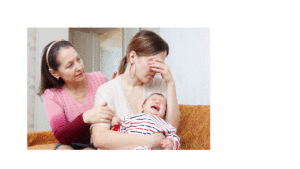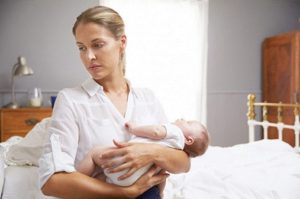I have also worked many years as a consultant at the Mama Mia Child Health Centre in Stockholm, with a group of nurses (health visitors) specialized in child health care and pediatricians. When a mother worries about her role as a parent, her marriage or her child, the nurse may suggest a consultation with me. In addition, we have regular supervision sessions to exchange experiences and become more skilled in helping these families.
Sometimes a mother arrives alone in my consulting room, to get some breathing space in a difficult situation. Sometimes two fresh parents worry about their new roles. The balance in their relationship has changed and they quarrel. Other times the mother comes with her baby because she is anxious about her feelings for the child, or about some symptom that cannot be explained from a medical pespective. With the help of the nurse, she has become open to the idea that perhaps, the feelings between her and the baby might be the explanation.
My aim during the first encounter is to get at “the hot spot”, and form an idea about which treatment might be most suitable. The hot spot is a perspective on the present situation, a “selected fact” as W.R. Bion called it, that might lead to a deeper understanding of the feelings of each family member. The idea is not to arrive at a psychiatric diagnosis but to suggest a formulation that best describes an aching point and captures the parents’ interest.
 For example, a mother is presented as having a postnatal depression. But I notice that the relationship with her husband seems to be the major trouble. Mum is angry and disappointed with Dad. She keeps a stiff upper lip, but her feelings pop out as nasty comments that upset him – and an evil circle starts spinning. Also, he may have troubles of his own after having become father. A brief couple therapy might be the most appropriate way of helping them get back on track again. I do this by putting words to their difficulties in seeing through the fog that exists in any relationship under pressure. For example: “You’re angry with your husband. But good girls don’t get mad, you think. So you bite the bullet and try to be nice. But he feels you are sore and sulky and he gets annoyed. Then the quarrel starts and, just like two boxers, each one of you withdraws to the ringside corner while staring at the opponent. Marriage could be more fun, right?”
For example, a mother is presented as having a postnatal depression. But I notice that the relationship with her husband seems to be the major trouble. Mum is angry and disappointed with Dad. She keeps a stiff upper lip, but her feelings pop out as nasty comments that upset him – and an evil circle starts spinning. Also, he may have troubles of his own after having become father. A brief couple therapy might be the most appropriate way of helping them get back on track again. I do this by putting words to their difficulties in seeing through the fog that exists in any relationship under pressure. For example: “You’re angry with your husband. But good girls don’t get mad, you think. So you bite the bullet and try to be nice. But he feels you are sore and sulky and he gets annoyed. Then the quarrel starts and, just like two boxers, each one of you withdraws to the ringside corner while staring at the opponent. Marriage could be more fun, right?”

Sometimes, Mum’s relationship to her mother is haunting her. She may harbour old feelings of resentment, and communication with her might be blocked. Before pregnancy, she thought she had become independent of her mother. Now they have become “colleagues”. This can bring them closer together but also open up old wounds. I might say: “You told yourself never to have a distanced relationship with your little daughter, like you had with your Mum. So, you strain yourself 110% and never leave your baby alone. The price seems to be that you’re exhausted and, perhaps also, annoyed with her. That could be interesting to talk about together.”

A mother might assert that her partner is “hopeless”. But I notice that she is most of all unhappy about her contact with the child. Perhaps the baby looks listless or sad when he does not reach his mother’s eyes. In this case, improving their interaction and relationship seems the most urgent goal. For example, I might turn to the baby, well aware that the mother is listening carefully: “I see that you don’t look into Mum’s eyes. Maybe you don’t know what goes inside her. Neither does she, I guess. This is bewildering to both of you. Mum tries hard to make you happy, but that isn’t easy when she isn’t happy herself.”
In other words, there is no standard treatment! An advisory consultation, a few couple therapy sessions, a lengthier mother-infant therapy… My experiences at the Child Health Centre led to the idea that psychoanalysts could work at such units. I thought this would make contacts easier to establish between parents, nurses, and the therapist. The nurses would receive supervision, which would help them becoming more agile in observing baby worries and suggesting treatment. The Swedish Inheritance Fund supported the project, and ten analysts were placed at units around Stockholm. The project was terminated in 2016 and is summarized (broschyr_arvsfonden) by the administrative head, Daniela Montelatici Prawitz. A scientific evaluation was performed by Katarina Kornaros at the Unit of Reproductive Health, Karolinska Institutet, Stockholm.
If you are looking for some general views on parenthood, read more on the menu Parents ask.
